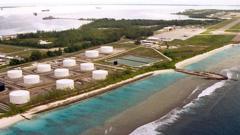UK sea temperatures soar after exceptionally warm Spring
Sea temperatures around the UK and Ireland have risen sharply, with some areas now 4°C warmer than normal. This increase is causing concerns about its effects on marine life and could impact people swimming in the area. Scientists link the warmer seas to climate change and expect such marine heatwaves to become more frequent and intense.
Key Facts:
- Sea temperatures around the UK and Ireland are now about 4°C warmer than usual in some places.
- The west coast of Ireland and parts of Cornwall and Devon are experiencing the most intense heat.
- April and early May saw the highest sea temperatures recorded for those months since 45 years ago.
- A marine heatwave happens when sea temperatures stay above the seasonal average for over five days.
- The current marine heatwave around the UK has lasted about two and a half months, which is unusually long.
- Warmer sea temperatures might disrupt marine life, affecting breeding patterns and possibly leading to more jellyfish and harmful algae blooms.
- Higher sea temperatures can also increase land temperatures as the heat moves from the ocean to the shore.
- In the past, marine heatwaves have brought fish like bluefin tuna into UK waters.



















